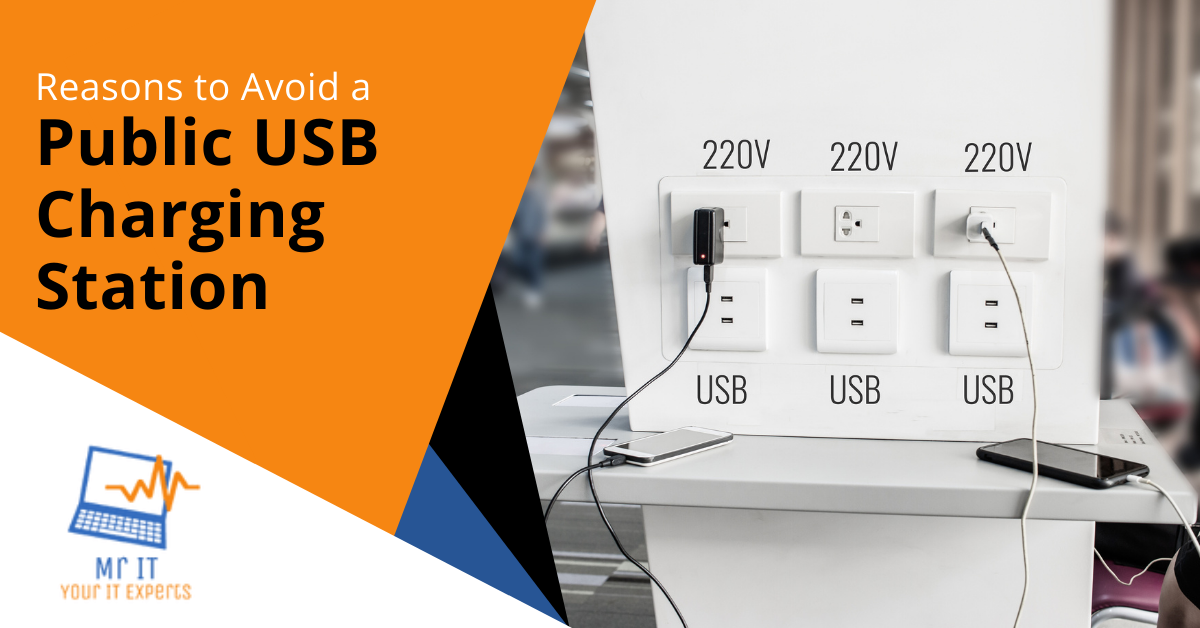We have all been out and about only to notice that our phone battery is under 10%! When this happens, it can be tempting to use a free, public USB charging station, which you often find in airports, train stations and malls.
However, be warned before you use these charging stations. They may have been tampered with by hackers.
What is a Public USB Charging Station?
A public USB charging station is a stand with free USB ports attached. You can plug your phone into these ports to charge your battery.
With so many of us using our phones while working from home and for personal purposes these days, it’s easy to see why public USB charging stations have become popular. Being out without your phone can be stressful!
Why Are USB Charging Stations a Security Risk?
The charging port you use at these stations is the same port that you use to upload and download data to other devices – such as when you plug your phone into your laptop through a USB. Because these ports are the same, there’s a risk of data theft when you use USB charging stations.
This trend is known as juice jacking – and it’s something that security researchers and state officials are increasingly worried about.
“You might have seen a public USB charging station at an airport or shopping centre. But be warned, a free charge could end up draining your bank account,” Los Angeles County Deputy District Attorney Luke Sisak said in a video warning in November 2021.
Today’s hackers have realized how many people use public USB charging stations – and they’ve devised ways to manipulate these points to exfiltrate sensitive data or deploy malware onto the devices that connect with them.
The simple act of plugging your phone into a USB charging station is enough to compromise your device – so you need to be careful.
What Are The Consequences of a Juice Jacking Attack?
A successful juice jacking attack works one of two ways. Firstly, the hacker could steal the data on your phone – which could include personal information and even credit card details – and use this information as the basis for fraud or further scams.
Secondly, the hacker could deploy malware onto your phone – such as ransomware, spyware or a trojan. These malicious pieces of software work in different ways to corrupt your device. For example, in the case of ransomware, you will be blocked from accessing your phone until you pay a ransomware demand to an untraceable cryptocurrency wallet.
How Prevelant is Juice Jacking?
Juice jacking is a relatively new phenomenon, meaning there’s not much research or data to discern how prevalent the threat is. However, just because there’s a lack of data, that doesn’t mean you shouldn’t take notice.
Generally speaking, public USB charging stations aren’t as secure as charging your device from home. So, instead of using these public stations, do this instead:
Purchase a Battery Bank to Charge Your Phone
Battery banks and spare batteries don’t cost a lot – and they’re much more secure than public USB points. Some battery banks are incredibly lightweight and can charge your device up to x10 times, making them an efficient way to keep your phone battery charged while on the go.
Use Electrical Outlets Rather Than USB Points
Most coffee shops, restaurants, and airports have free electrical outlets for the public to use. We advise bringing out your phone’s USB charger and electrical plug, and charging your phone directly from an outlet instead of a USB point.
Lock Your Phone
If you’re caught out without a charger, and you really need to use a USB point, make sure to lock your phone with a PIN before you connect – and keep it locked throughout. This should minimize the risk of a successful attack.
Other Mobile Security Tips to Bear in Mind
Mobile devices are a top target for cybercriminals. Juice jacking isn’t the only threat you need to be aware of. Be mindful of these tips while you use your mobile phone in public spaces:
- Use Public Wifi Networks carefully. For Example Do Not Use your online banking apps or look at sensitive information while on a public network.
- Always protect your device with a PIN and Face ID or Touch ID where possible.
- Be wary of unexpected emails or text messages to your phone. Scrutinize the content before clicking a link or opening an attachment.
We Can Help You To Keep Your Mobile Devices Secure
If you’re concerned about the security of your mobile phone, Mr IT can help you. We offer a range of smartphone security solutions that can enhance your safety while out and about.
Contact us for a free consultation. Call us on 03 9087 4389. You Can Find out More about abour services Here
